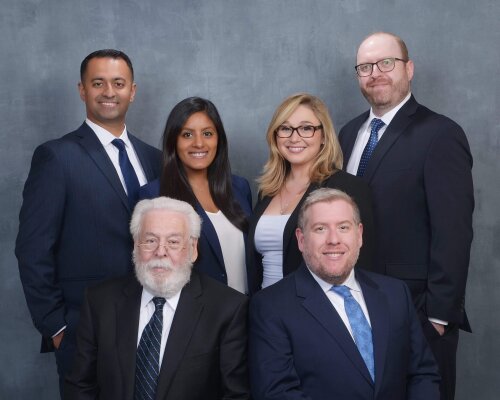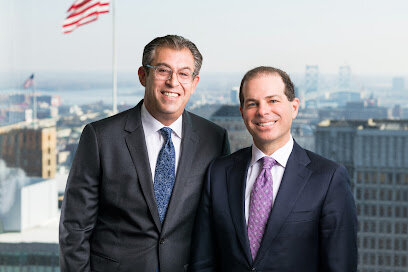Best Lawyers in Philadelphia
Share your needs with us, get contacted by law firms.
Free. Takes 2 min.
List of the best lawyers in Philadelphia, United States
United States Legal Questions answered by Lawyers
Browse our 39 legal questions in United States and read the lawyer answers, or ask your own questions for free.
- Inquiry Regarding Representation for Family Court Appeal
- Hello, I am seeking legal assistance for a family law matter involving an appeal of a recent court decision. I would like to know whether your firm handles appellate work in family cases and, if so, what information or documents you would need from me to evaluate the case. Could... Read more →
-
Lawyer answer by Ascendance International Consulting (A-I-C)
Thank you for reaching out regarding your family law appeal. Yes, our firm handles appellate work in family law cases, and we’d be happy to help you review your situation. To evaluate your case, we would typically need relevant documents,...
Read full answer - Internal investigation of sexual harassment in US
- I’m from [company removed], based in Hong Kong. One of my firm’s US employee reported to internal legal that I have sexually harassed her during my last trip to New York. An internal investigation is kicking off and I will be interviewed by firm legal. Also I have the opportunity... Read more →
-
Lawyer answer by Ascendance International Consulting (A-I-C)
This is a serious matter, and it’s important to approach it with care. Since you have the opportunity to submit a written statement to the internal committee, we strongly recommend that you take time to carefully document your side of...
Read full answer - Prenup Review and Signature
- I am looking for a Brazilian attorney to legally review a prenup with my fiancée. The prenup is only 18 pages written in both English and Portuguese. My fiancée speaks and reads English. The prenup follows USA/Virginia law. Once reviewed and signed by a lawyer with my fiancée, she can... Read more →
-
Lawyer answer by Castro Magalhães Law Offices
February 23, 2026 Proposal for Legal Services: Review of Prenuptial Agreement Dear Client, I am pleased to submit this proposal for the provision of legal services related to the review of a prenuptial agreement drafted in accordance with the laws...
Read full answer
United States Legal Articles
Browse our 33 legal articles in United States written by expert lawyers.
- New York Climate Superfund Act Liability 2026 Guide
- This new US climate cost recovery law is retroactive and targets large historical greenhouse gas (GHG) emitters in energy, industrial, and logistics sectors as "responsible parties" for a $75 billion fund. Liability is strict: the government does not need to prove fault, negligence, or causation of specific climate harms, only... Read more →
- NY 2026 Corp Tax: Thresholds & Franchise
- For tax years beginning on or after January 1, 2026, New York businesses will only be required to make estimated tax payments if their expected New York tax (including any MTA surcharge) is at least $5,000, up from $1,000. Many small and some mid-sized New York corporations and S corporations... Read more →
- Are Non-Competes Enforceable in New York?
- Non-competes are still legal in New York and most of the United States, but courts apply strict scrutiny and often refuse to enforce broad, form agreements. Governor Hochul vetoed New York's broad non-compete ban (often referenced as S4641A / S3100A) in December 2023, so as of my last update there... Read more →
About hiring a lawyer in Philadelphia, United States
Hiring a lawyer in Philadelphia follows a few common steps. First, identify the area of law that matches your issue - for example criminal defense, family law, landlord-tenant, employment, personal injury, or business law. Next, research attorneys or law firms with experience in that area and in Philadelphia courts. Contact several lawyers to request an initial consultation, which is often free or offered for a reduced fee. During consultations, describe your matter, ask about experience, fee structure, likely timeline, and any conflicts of interest. If you choose to hire a lawyer, you will usually sign a written fee agreement or engagement letter that explains fees, billing, scope of work, and how to end the relationship if needed. Your attorney will then begin representing you, filing necessary paperwork, negotiating with other parties, and appearing in court if required.
Why You May Need a Lawyer
People seek legal help in Philadelphia for many reasons. Common situations include criminal charges where legal representation can protect liberty and records, family law matters such as divorce, child custody, and support, and landlord-tenant disputes like eviction or habitability complaints. Other frequent needs are personal injury claims following an accident, employment disputes including wrongful termination and wage claims, consumer and debt problems, real estate and closing issues, small business formation and contract disputes, zoning and land use matters with the City of Philadelphia, and debt collection or bankruptcy. Complex regulatory issues or interactions with city agencies may also require a lawyer to navigate administrative procedures and protect your rights.
Local Laws Overview
Philadelphia legal matters are governed by a combination of federal law, Pennsylvania state law, and Philadelphia city ordinances. Key local institutions include the Philadelphia Municipal Court, which handles many traffic and landlord-tenant cases and lower-level criminal matters, and the Philadelphia Court of Common Pleas, which hears more serious criminal matters, civil lawsuits, family law cases, and probate. For federal matters the United States District Court for the Eastern District of Pennsylvania handles federal civil and criminal cases arising in Philadelphia.
Cities like Philadelphia also have local codes covering housing, building and safety, licensing and inspections, zoning, and consumer protections. Landlord-tenant disputes often involve both Pennsylvania statutes and Philadelphia tenant-protection ordinances. Employment disputes may involve state wage and hour laws as well as federal statutes such as the Fair Labor Standards Act. Statutes of limitations and procedural rules differ depending on the type of case, so timelines for filing claims can be strict. Always confirm applicable deadlines and procedural requirements with a qualified attorney or by consulting the official court rules.
Frequently Asked Questions
How do I find a qualified lawyer in Philadelphia?
Start by identifying lawyers or firms that specialize in the area of law you need. Use referrals from friends or family, recommendations from other professionals, and attorney directories. You can also contact the Philadelphia Bar Association for a lawyer referral service and check court records to see lawyers who handle cases similar to yours. During initial consultations, ask about experience with Philadelphia courts, outcomes in similar matters, and whether the lawyer has handled cases in the same judge or court division.
How much will a lawyer cost in Philadelphia?
Costs vary widely by practice area, lawyer experience, and case complexity. Common fee structures include hourly rates, flat fees for discrete services, contingency fees for many personal injury and some civil cases, and retainers or deposits. Hourly rates can range from modest amounts for less experienced attorneys to substantially higher for specialists. Always ask for a clear written fee agreement that explains what is and is not included, how bills will be calculated, billing intervals, and any costs you may be responsible for such as court filing fees, expert witness fees, and process service.
Can I get a free or low-cost lawyer in Philadelphia?
Yes. Many firms offer a free or low-cost initial consultation. Legal aid organizations and pro bono programs assist low-income individuals with certain civil matters. The Philadelphia Bar Association and other local organizations maintain pro bono and referral programs. Public defenders are appointed for people facing criminal charges who cannot afford private counsel. Eligibility and availability vary by organization and case type, so contact providers early.
Do I need a lawyer licensed in Pennsylvania to handle my case?
Generally, attorneys who represent clients in Pennsylvania courts must be licensed by the Pennsylvania Bar. Out-of-state attorneys may be permitted to appear for certain matters with court permission or in cooperation with a local counsel, but routine representation in Pennsylvania courts typically requires a Pennsylvania-licensed attorney. For federal court matters in the Eastern District of Pennsylvania, attorneys must be admitted to practice before that court or obtain permission to appear pro hac vice in specific cases.
How can I check a lawyer's standing or disciplinary history?
You can check an attorney's license status and disciplinary history through official court or state regulatory resources. The Unified Judicial System of Pennsylvania and the Pennsylvania courts maintain attorney directories and information about admissions and discipline. The Philadelphia courts or the state judiciary web pages provide access to these official records. If you have concerns about an attorney's conduct, the appropriate disciplinary authority or the courts can explain complaint procedures.
What should I bring to my first meeting with a lawyer?
Bring all documents related to your matter, such as contracts, letters, notices, police reports, court papers, emails, photographs, medical bills, and any correspondence. Make a timeline of events and a list of key dates and witnesses. Prepare a list of questions about fees, likely outcomes, next steps, and the attorney's experience. If you have limited time, send documents ahead of the meeting if possible so the lawyer can review them beforehand.
How long will my case take in Philadelphia?
Case duration depends on the type of matter, court backlog, complexity, discovery needs, and the willingness of parties to negotiate. Some matters such as uncontested divorces or small claims may resolve in months, while contested civil litigation, major criminal cases, complex family matters, and appeals can take a year or more. Your attorney should provide a realistic timeline and update you as events progress.
Can I represent myself in court in Philadelphia?
Yes, you have the right to represent yourself, known as proceeding pro se, but it carries risks. Court procedures, filing rules, deadlines, evidentiary standards, and pleading requirements can be technical. Self-representation is most practical for simple matters where the stakes are low. For complex litigation, criminal charges, or cases with significant financial or personal consequences, hiring an experienced lawyer is strongly recommended.
What is attorney-client privilege and confidentiality?
Attorney-client privilege protects confidential communications between you and your lawyer made for the purpose of obtaining legal advice. It generally prevents the lawyer from disclosing those communications without your consent. Privilege has limits - for example communications made to further a crime or fraud are not protected. Confidentiality obligations and privilege are important safeguards, so be open with your counsel while understanding these limits. Ask your lawyer to explain how privilege applies in your case.
How do contingency fees work and when are they used?
Contingency fees mean the lawyer is paid a percentage of any recovery you receive, and you do not pay attorney fees if there is no recovery. They are common in personal injury, some employment claims, and certain consumer cases. The fee percentage and how costs are handled if a recovery occurs should be clearly stated in a written agreement. Contingency arrangements are not appropriate for all types of cases, so discuss alternatives if contingency is not available.
Additional Resources
Official and governmental resources you may find helpful include the City of Philadelphia website for local services and regulatory information - the Unified Judicial System of Pennsylvania for court rules and attorney information - the Philadelphia Courts site for local court contacts and procedures - and the United States District Court for the Eastern District of Pennsylvania for federal court matters - For issues involving state government agencies, use the Commonwealth of Pennsylvania official portal -
In addition to government sources, consider contacting the Philadelphia Bar Association and local legal aid organizations for referrals and low-cost assistance. Many local law schools host clinics that provide supervised legal help in certain areas. If you are facing criminal charges and cannot afford counsel, advise the court and you may be eligible for a public defender.
Next Steps
If you need legal assistance in Philadelphia, start by identifying the type of legal help you require and gather all relevant documents and dates. Use official resources and bar association referral services to create a short list of attorneys with appropriate experience. Schedule initial consultations, prepare questions about experience, fees, and strategy, and compare fee agreements and communication styles. If cost is a concern, ask about payment options, sliding-fee schedules, pro bono services, or legal aid eligibility. Once you retain a lawyer, request a written engagement agreement, provide requested documents promptly, and stay responsive to communications to keep your matter moving forward.
This guide is informational and does not create an attorney-client relationship or constitute legal advice. For advice tailored to your specific situation, consult a licensed attorney in Pennsylvania.
Lawzana helps you find the best lawyers and law firms in Philadelphia through a curated and pre-screened list of qualified legal professionals. Our platform offers rankings and detailed profiles of attorneys and law firms, allowing you to compare based on practice areas, experience, and client feedback.
Each profile includes a description of the firm's areas of practice, client reviews, team members and partners, year of establishment, spoken languages, office locations, contact information, social media presence, and any published articles or resources. Most firms on our platform speak English and are experienced in both local and international legal matters.
Get a quote from top-rated law firms in Philadelphia, United States — quickly, securely, and without unnecessary hassle.
Disclaimer:
The information provided on this page is for general informational purposes only and does not constitute legal advice. While we strive to ensure the accuracy and relevance of the content, legal information may change over time, and interpretations of the law can vary. You should always consult with a qualified legal professional for advice specific to your situation.
We disclaim all liability for actions taken or not taken based on the content of this page. If you believe any information is incorrect or outdated, please contact us, and we will review and update it where appropriate.
Refine your search by selecting a practice area.































